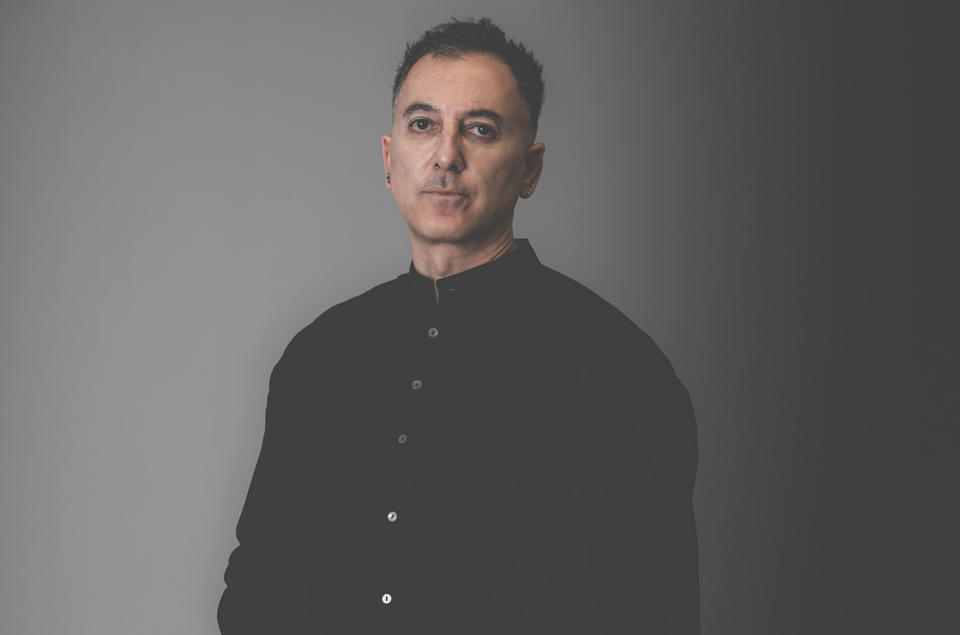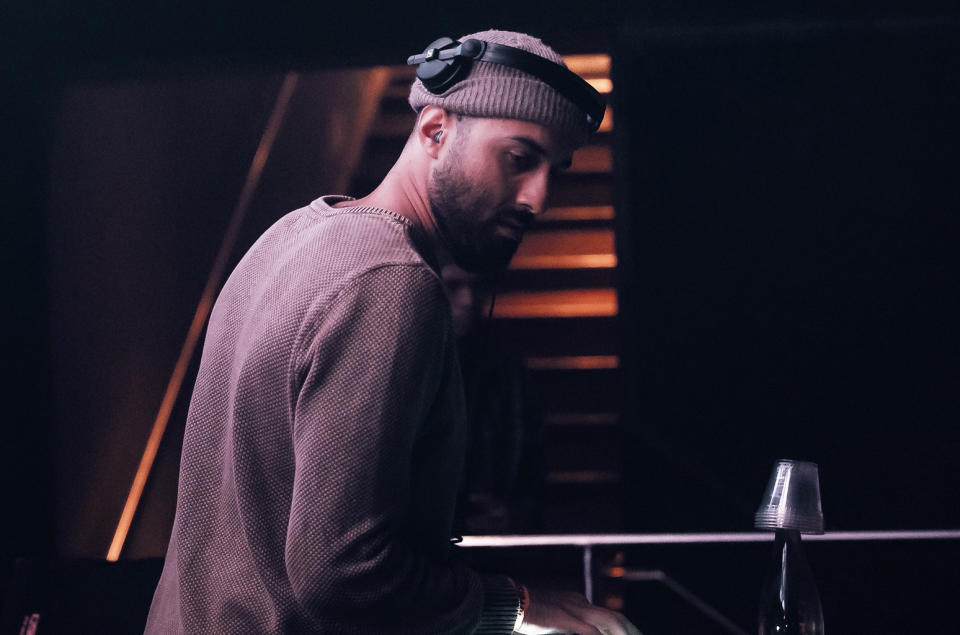‘It Breaks My Heart’: Iranian Electronic Artists Dubfire, Lady Faith & Starfari on the Country’s Ongoing Protests & The Beauty of Their Culture
- Oops!Something went wrong.Please try again later.
- Oops!Something went wrong.Please try again later.

The current images of Iran on the news and social media are of impassioned protests from a resilient people who’ve had enough of their country’s oppressive Islamic regime. Most recently, the regime’s brutal retaliation methods have taken center stage, yet the Iranian people continue to resist.
These uprisings, which have rippled across the globe and ignited similar protests among the Iranian diaspora in U.S., throughout Europe and beyond, were sparked by the murder of 22-year-old Mahsa Amini on Sept. 16, 2022. Her death was the result of beatings by the Islamic regime’s morality police, given as a punishment for her insufficient hijab — in this case, her head covering.
More from Billboard
Marco Carola, Camelphat, Francesca Lombardo & Gordo Lead Lineup for Saint Martin's SXM Festival 2023
In the nearly four months since Amini’s death, the Center for Human Rights in Iran reports the wrongful imprisonment of more than 18,000 protestors and over 500 government-sanctioned murders, including barbaric public hangings. Among the prisoners facing possible execution are doctors, journalists, athletes, actors, directors, poets and musical artists. These include rappers Toomaj Salehi, Saman Yasin and Behrad Ali Konari, who are charged with “corruption on earth,” a capital offense in Iran. Per Newsweek, Yasin was convicted of this crime October, with a petition to save his life garnering thousands of signatures.
Early in the protests, Iranian musician Shervin Hajipour was also arrested for his song “Baraye.” Hajipour took the song’s heart-wrenching lyrics from online messages posted by Iranians speaking about what they are protesting, his emotional delivery resonating whether listeners understood the Farsi-language lyrics or not. In October, Coldplay performed a version of the song with Iranian actress Golshifteh Farahani at the band’s two stadium shows in Buenos Aires. And 95,000 of 115,000 submissions to the Recording Academy for its new special merit award, song for social change, were for “Baraye.” (The Islamic regime forced Hajipour to take down the song — although it lives on via social media.)
Since October, when Hajipour was released on bail to await trial, there has been no news on the musician’s whereabouts. Still, “Baraye” is the movement’s unofficial anthem — and is sung at global Iran protests, which continued this week (Jan. 8), as thousands of people marched in solidarity in London, Lyon and Rome.
This Iran of today stands in sharp contrast to the Iran of less than 50 years ago. At that time, under the rule of the country’s monarch, or shah, Iran was thriving in industry, healthcare and education. It was a progressive country becoming a player on the global stage — yet there was dissatisfaction among Iran’s lower classes.
Tapping into this longstanding discontent, the Islamic Revolution took place over the course of less than three months. The Islamic Republic of Iran was established by referendum on April 1, 1979. Overnight, the country rewound back 1,357 years to the time of the Prophet Muhammed and fundamentalist Islamic laws. Gone were all the entertainment venues. Artistic voices were silenced. Women were required to shroud themselves. The excitement of having a new regime that promised freedom of expression was quickly replaced with cowering fear.
As hardstyle queen Lady Faith puts it, “On one hand, you had so much history on display at all times, a representation of an advanced cultural history full of color and happiness. On the other hand, you have a regime that did everything in their power to cover the people in darkness, stamp out individual lights and force an entire population to live in the past.”
Many families fled the country, including that of house music stalwart Dubfire, who left with his family during the Islamic Revolution when he was seven years old, settling in Washington D.C. Dubfire – who won the Grammy for best remixed recording (non-classical) in 2002 – didn’t get immersed in Western music until he moved to the U.S., but was always drawn to the “atmosphere and sonic power” of traditional Iranian instruments.
Other families, like that of Faith, remained in Iran. Faith was born after the Islamic Revolution and grew up surrounded by art, in the form of the music and fashionable creations of her clothing designer mother, both of which were hugely influential on her. While she was gestating as an artist at home, nonconformist Faith was a misfit at school and a target for the morality police. In part to protect Faith’s safety, her family eventually moved to Portland. Her songs “Speak My Mind,” “We the People” and “Different” carry direct links to her teenage experiences in post-revolution Iran.
Up-and-coming producer Starfari, on the other hand, was born and raised in the U.S., long after the establishment of the Islamic regime. He visited Iran for the first time when he was 16, experiencing the country as a tourist.
In many ways, the oppression of the Islamic Republic has impacted these artists and their styles, with electronic music functioning as both a release for their challenging experiences and as a platform to pay homage to their homeland. Here, the three discuss how this heritage has helped shape their work, along with their feelings about the current protests.
What are your thoughts and feelings about what’s been happening in Iran since Mahsa Amini’s murder?
Starfari: My thoughts and feelings are mixed. I think it’s horrible what’s happening now, and especially what’s been happening the last 40 years, but I think it’s incredible that people are coming together to fight for what they believe. It’s surprising and remarkable how the people have held up, worked together, helped each other, and stayed resilient through it all. They’ve had enough. They have nothing to lose. The courage of the people of Iran should be praised. Since the beginning, I was optimistic that the people would be successful — even though my older relatives and parents weren’t. Regardless, Iran will never be the same.
Dubfire: Even though I never returned, I still feel a strong connection to my birthplace and people. Like most Iranians scattered around the globe, I too feel incredibly inspired by the brave youth, especially women, who are leading the movement for change. Their slogan “Woman, Life, Freedom,” as well as the protest song, “Baraye,” by Shervin Hajipour, has captured the hearts and minds of Iranians and non-Iranians the world over, including many of my artist friends. While the resistance to the Islamic Regime is not a new topic in Iran, the sheer energy and intersectionality of this current movement — along with the immediate access to online information — make it the [Iranian people’s] most promising crusade for change to date.
Lady Faith: The world is so colorful these days, and this Iranian regime is working overtime to keep its population isolated from having dreams and believing their lives could be better. This regime is determined to impose their will on everybody, because without the suppression, freedom for the people ends their corruption. Change, however, is inevitable sometimes.

What are your impressions of the musical artists that have been arrested by the Islamic regime?
Dubfire: I was not familiar with any of these artists prior to the protests. Toomaj had previously been jailed [Salehi was arrested in September 2021 for speaking against the regime], yet he had the courage to once again openly criticize this regime from the streets of Iran. Despite the regime’s attempts to silence these pivotal artists, what we are witnessing is the opposite effect: They have been propelled into the international spotlight and are fueling much stronger opposition to this regime and its atrocities.
Lady Faith: One of the most effective ways to communicate is through music, and great Iranian artists such as Shervin and Toomaj have done just that. The Iranian regime knows the power of music to a population that wants to dream of a better future. Music is more powerful than guns, batons, pepper spray or even the most fearsome Basiji.
“Baraye” has received global attention including a 2023 nomination for the special-merit best song for social change Grammy. What do you think it will mean for Iranians across the globe if it wins?
Dubfire: Music has always been in part political, and so I’m thrilled to see Shervin’s beautiful and haunting “Baraye” resonating with so many people around the globe. As an Iranian Grammy-winning artist myself, I feel proud that his protest song has flooded the organizations’ submission box in an important new category, which is bound to be a highlight of all future awards and will undoubtedly embolden the revolutionaries in Iran.
Lady Faith: A Grammy for Shervin will be a powerful acknowledgment by the Western community of our struggles and sacrifices. Global attention will bring about change.
Starfari: It would show that the power of art extends beyond just personal enjoyment, to its strength in providing a lasting human connection around the world. It will also show that the music and art world stand in solidarity with the people, most importantly the women, of Iran.
What are some of your own experiences in Iran?
Dubfire: Most of what I recollect from those early childhood years [is] a bit hazy, but I was very happy and free, surrounded by the love I felt around my extended family. Our gatherings always involved the most lavish display of Persian cuisine one could imagine, and poetry readings backed by live instrumentation.
I have scattered memories of the revolution. My mother worriedly turning off all the lights in our home and holding my brother and I in the darkness while peering out at the madness in the streets. The fires, marches, chants and random acts of violence on full display. And me yearning for my father’s protection, absent at the time, as he was pursuing his doctorate in Washington, D.C.
Lady Faith: I was born in Tehran and the Islamic Republic of Iran is all I had ever known. It was adherence to a strict interpretation of Islamic law. For me, this was life as normal, but for my parents, it was a transitional time where everything changed and there was societal pressure to conform.
I developed a pretty rebellious spirit. It wasn’t long before I attracted the attention of the morality police, or Basij. These radicals, either plainclothes or covered in head to toe, were constantly chasing me and my friends. It was a lifelong game of hide-and-seek. I was never caught, but for those that were, the punishments were severe. I personally was threatened at gunpoint for playing Metallica within earshot of the Basij. It’s sad that almost every group of Basij had a conservative female or two with them. Women suppressing other women. Shameful!
Starfari: [When I visited], Iran had a much more somber feel at times than the photos. It was cold and rainy in Tehran. There were soldiers on many corners wielding automatic weapons. The energy I felt in homes of friends and family and in restaurants or out and about from the people was warm and welcoming. The people of Iran are how I had expected, at least the ones I met. I even went snowboarding! It seems to surprise people that Iran isn’t a desert.

What was it like assimilating to American culture? How did music help you in that process?
Dubire: The biggest challenge for my parents, brother and I was that we suddenly found ourselves in a strange and unfamiliar place, isolated from our relatives, most of whom stayed behind. Soon after, we were subjected to a great deal of hostility due to the prevailing hostage crisis. Intense images of Ayatollah Khomeini and his followers chanting “Death to America” were all over the media, and we watched in horror as life back home became even more foreign to us. And though we didn’t really feel welcome in our new home, we had no choice but to stay and rebuild our lives from scratch.
This was especially hard on my parents who had to work odd, low-paying jobs and long hours. Since I didn’t speak the language, I spent a great deal of time expressing myself through drawing, which in later years extended to photography and music. I quickly realized that I had a deep passion for the creative arts.
Lady Faith: The journey was not easy. It was a complex time, and music became my salvation. I had a passion for heavy metal and gangster rap, and while my family was very musical, these styles were taboo in Iran. I would listen with my friends behind closed doors. Music helped blunt the transition from the negative and colorless things that surrounded me wherever I went out in public. I was particularly rebellious during my teenage years. I am so lucky that my family was able to bring me to America. I truly understand the suppression going on among the youth and females in Iran. It breaks my heart to see their struggles.

Have the uprisings in Iran and the murders of Iranian people by the Islamic regime served as inspiration for you to create anything of your own?
Dubfire: Yes of course, but perhaps there is a different angle or approach I can take, musically speaking, which isn’t obvious and would resonate deeper into the fabric of the global electronic music community to galvanize the masses towards a specific goal. I will actually find out once I dive back into the studio [early this year.]
Lady Faith: The situation in Iran right now is very stressful and has great impacts on all Iranians. It is a cause that is very important, and I am still processing my feelings. When the time is right, I will consider making a musical contribution to the cause — but right now I do not wish to make any promises to my fans that I may not fulfill.
Starfari: I think what’s most important as far as my involvement in providing a response is my connection to people here in the States. When they can see something they have a connection to, it’s easier to make the horrors be more tangible.
What is your hope for the future of Iran?
Lady Faith: I hope and pray that there is major change in Iran, where its amazing people can become individuals living their own lives how they want and are allowed to dream of things that are not forced upon them. I have been blessed to be a part of the American society where freedom is something we take for granted — but I have lived in both environments, and I truly hope that more Iranians get to experience just a touch of what we get to take for granted.
Dubfire: We can all contribute by shining a spotlight on, and echoing the voices of, the brave protesters in Iran who are risking their lives for basic freedoms and democracy.

